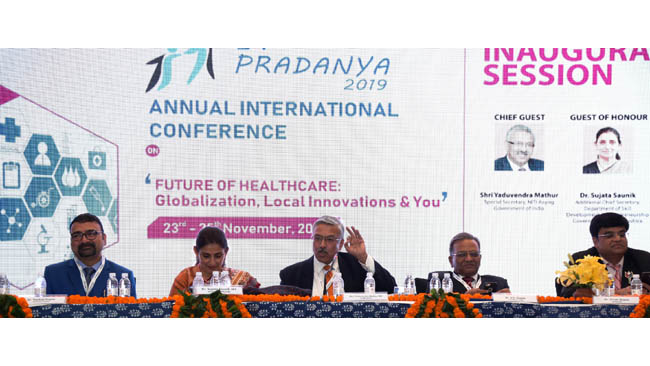
Hyderabad, November 29, 2019: The 24th international conference of IIHMR University, Pradanya 2019, concluded at its Jaipur campus recently. The theme of the three-day event was “Future of Healthcare: Globalization, Innovations and You.” It brought together over 35 healthcare experts and policy makers at the University, which is recognized as an ‘Institute of Excellence’ by the Ministry of Health & Family Welfare, Govt. of India. Shri Yaduvendra Mathur (IAS),Special Secretary, NITI Aayog, was the Chief Guest and Keynote Speaker.
Said Dr. Pankaj Gupta, President, IIHMR University, Jaipur: “Since the last more than two decades, Pradanya has been focusing on the most relevant and burning topics of healthcare that have immense significance for India. This year, it presented vision of healthcare of the future by focusing on breakthrough technologies, transformations, innovations and discoveries, as well as the existing healthcare models and best practices. It is important for students of healthcare to share knowledge about not only the current best practices but also the upcoming ones. But mere knowledge is not enough. It must be digested well, converted to wisdom and applied in practice. Knowledge must lead to transformation of the individual.”
Addressing the audiences, Dr. SD Gupta, Chairman, IIHMR University, Jaipur, said that a rapidly expanding pool of ageing population, epidemiological transition and use of technology are three phenomena that are going to impact future of Indian healthcare, but the country is not well equipped to handle any of these. He said: “The magnitude of healthcare challenges facing India is quite high. Though India’s demographic dividend will last till 2060, its pool of elderly population is also expanding. Today, 9% of India’s population is over 60 years of age, up from 6% in previous census. In couple of years, it will be 11%, amounting to a staggering 120 million people. India will be required to take care of their long-term healthcare needs.”
He added: “The disease profile facing India has inverted between 1980 and 2020. Forty years ago, communicable diseases accounted for 75% of total disease burden. Today, non-communicable diseases (NCDs) constitute 65% of it, a figure going to rise to 70% in five years. NCDs also need long-term disease and treatment management. India has to face this challenge of rising burden of NCDs and its unique demands on healthcare delivery.”
Said Dr. SD Gupta: “In the last couple of decades, technology has emerged in a big way. Its impact has not been restricted to devices and medical equipment alone. The means of access to healthcare have also changed. Mobile technology or e-health are buzzwords today. One area in which technology can be effectively used is by improving access and availability of mental healthcare in rural areas. We already have a project running in this area which can be upscaled. This is significant because 15% of Indians – about 200 million people – suffer from some form of mental sickness, and many of them reside in rural areas.”
Yaduvendra Mathur, Special Secretary, NITI Ayog, said that India’s healthcare system lags behind comparable nations in Asia. India figures at number 145 in global healthcare, compared to 92 for China and 71 for Sri Lanka. The Out of Pocket (OOP) expenditure for India is 63%, compared to 36% for China and 37% for Indonesia. He said: “Low performance of Indian healthcare is due to its deeply fragmented nature. He said that the financing landscape, service delivery, health records and purchase of medical supplies are severely fragmented. This fragmentation needs to be addressed through better risk profiling / insurance of patients, strategic purchasing of medicines and medical supplies by Government and care givers, better organization of healthcare delivery, and creating a digital health landscape. Ayushman Bharat and initiatives like National Medical Commission Act and National Digital Health Blueprint have created a strong foundation for such integration.”
Sh. Yaduvendra Mathur said that the future health system of India needs five focus areas: (i) Deliver on the unfinished public health agenda, (ii) shift health financing away from out-of-pocket spend to larger insurers, (iii) integrate service delivery horizontally and vertically, (iv) empower citizens to become better buyers of health, and (v) harness the power of digital health.
Dr Sujata Saunik, IAS, Additional Chief Secretary, Dept. of Skill Development & Entrepreneurship, Govt. of Maharashtra was the Guest of Honour at Pradanya 2019. She recounted five things that would impact Indian healthcare in a big way. She said: “First is innovation – we have to create new ways to manage public health at district, state and national level. Second is climate change which is going to majorly impact our agriculture, our diet, and disease profiles. Third is malnutrition – the average child in India suffers from significant wastage and stunting. Fourth is the rising burden of chronic diseases that need life-long care. Fifth is the absence of electronic health records in the country, due to which we cannot still exploit technological tools like machine learning and artificial intelligence to solve the challenges of public health.”
Other dignitaries who spoke at the various sessions included Dr. Sujata Saunik (IAS), Addl. Chief Secretary, Dept of Skill Development & Entrepreneurship, Govt. of Maharashtra; Naveen Jain, Secretary, Dept of Skill, Employment & Entrepreneurship Development, Govt of Rajasthan; Dr. Manish Diwan, Head, Strategic Partnership & Entrepreneurship, Biotechnology Industry Research Assistance Council (BIRAC), Govt. of India; Dr. Nimesh G. Desai, Director, Institute of Human Behaviour & Allied Sciences (IHBAS), Govt. of India; and Dr. Harsh Shah, State Program Manager, National Health Mission, Govt. of Gujarat.
Pradanya means “wisdom.” The event has had a long journey of 23 years spreading wisdom amongst young minds and professionals of healthcare, hospital, pharmaceutical and rural development sectors. It has served as a prominent platform of interaction between industry luminaries and fresh talent pool of students. It encourages students to display their knowledge in the form of research papers and posters, which over the years have been published in various journals throughout the world.